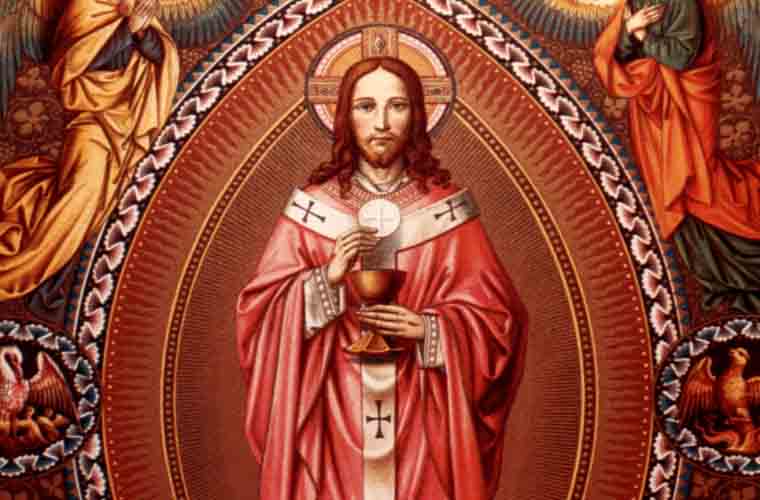Last week we had the privilege at most of our parish Masses to have three of the seminarians from Mt. St. Mary’s in Cincinnati serving at the altar: Stephen our resident intern, Patrick our previous intern from last year, and Deacon Joseph Morgan who is practicing his preaching with us as part of his seminary training. Beginning next week, from November 7th through 14th, the Archdiocese observes vocation awareness week. We have a visiting missioner on November 7th, so on the 14th Deacon Joseph will speak about vocations in his homily and Stephen will speak briefly about his own vocation after Communion.
Vocations include holy marriage and religious life as well as the priesthood, but I want to focus on the vocation to the priesthood for two reasons. The first is that we are in the midst of a major “overhaul” of the way we engage in parish life due in large part to a lack of priestly vocations so we are all painfully aware that this is a problem for the local church. On the more positive side, we are in the midst of a seven-week cycle of beautiful readings on the priesthood at Mass. We have been taking the second reading from the Letter to the Hebrews since the beginning of October.
I will leave it to the Biblical scholars to decide who wrote this letter, when, and to whom. Many think that it was written in the early Church in a time of persecution, where the Christians were not accepted by their Jewish brethren and had a difficult time holding on to the faith. Whatever the circumstances, it contains a rich, poetic and profoundly beautiful reflection on the priesthood of Jesus Christ: what it means that Jesus Christ is our one true high priest; how the priesthood developed among God’s first chosen priesthood; what the Christian priesthood means and how it is connected with Jesus’ priesthood; and how chosen men sharing in Christ’s priesthood are essential for our salvation. There’s a lot packed in there! It is permeated with a deeply Catholic sense of the beauty and power of the priest – so much so, that Martin Luther, one of the Protestant “reformers” of the 16th century, wanted to take it out of the Bible because he rejected the Church’s notion of the priesthood, opting instead for the establishment of a ministry of those merely performing a function among the men.
But as beautifully revealed in Hebrews, the priesthood is far, far more than a “job.” Some of our recent popes, including St. John Paul II and Benedict XVI, have repeatedly warned against reducing the priesthood to a mere function or task. Rather, to use the $10 word from the Greek, the Church has always taught that the priest is ontologically different than other men. That means that, when he is ordained through the sacrament of holy orders, he is changed at the very core of his being as he becomes “a priest forever according to the order of Melchizedek (7:17).” This beautiful verse is often chanted during an ordination ceremony. It refers to the fact that (unlike during Old Testament times), the priesthood has nothing to do with heredity or “choosing a profession” but rather involves being chosen by God Himself to be a man of sacrifice, whose whole life will be dedicated to bridging the gap between God’s holiness and man’s sinfulness. Or, to put it another way, giving up his own life so that others may have eternal life in Heaven.
The priest is able to do this not by his own power or talents, although all of his human gifts and talents are to be put at the service of his priesthood. (Seminary formation is designed to train the men to do this). Rather, the power of the priesthood is a gift from God. The man chosen by God and His Church to serve as a priest can only bear fruit in His ministry by allowing Himself to be conformed to Jesus Christ the High Priest.
The author of Hebrews goes to great lengths to make this point: the Old Testament priesthood had no lasting power. Certainly, our spiritual ancestors knew that in response to God’s goodness and our sinfulness, we were to make atonement for our sins and an offering of sacrifice to God. (We read a great deal in Scripture about the animal and cereal offerings they made). But even though those were an act of love and an attempt to worship as best as men could, they had to be offered over and over to no avail. It was not until Jesus Christ the Son of God became man and offered His life in sacrifice on the Holy Cross as the Lamb of God that we could “break the cycle.” Because Jesus alone could offer the perfect sacrifice of Himself on the Cross, that sacrifice could be extended across space and time by the men He chose to make it present again in the holy sacrifice of the Mass.
That is at the very core of who the priest is: the man of sacrifice, the man of the Mass. Because Jesus gives him the inestimable privilege of acting in His person as Christ the Head of the Church, he is empowered to offer the saving sacraments of Mass and confession for the forgiveness of sins.
When we say that a man is a “priest forever” and his soul is indelibly changed, that means that his whole life on earth is given for that mission and (if he remains faithful to Christ) will continue offering that sacrifice of praise for all eternity.
